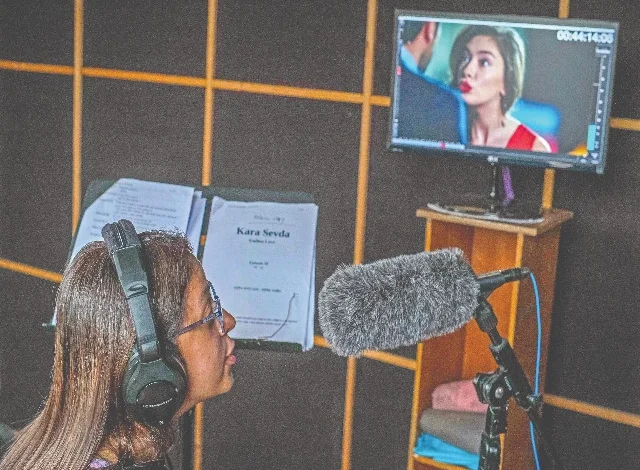Turkish TV dramas are reshaping Bangladesh’s screens

From dubbed soap operas to Turkish restaurants, Ankara and Dhaka’s growing cultural and political ties
Voiceover artist Rubaiya Matin Gity dubs her part in the Turkish soap opera ‘Kara Sevda’ at Deepto TV in Dhaka. Photo: AFP
DHAKA:
In a soundproof studio in central Dhaka, voiceover artist Rubaiya Matin Gity leans into the microphone, her tone rising with emotion as she breathes Bangla life into a Turkish drama that has become a cultural sensation across Bangladesh.
“Yasmeen! Yasmeen! I have fallen in love…” she calls out, eyes locked on the screen showing the latest episode of ‘Kara Sevda’ — known internationally as ‘Endless Love’ – a Turkish television drama that has captured millions of South Asian viewers and symbolised a quiet but notable shift in the country’s global outlook.
The soaring popularity of Turkish television soaps in Bangladesh is doing more than shaping prime-time entertainment. It mirrors an evolving political and cultural alignment between two Muslim-majority nations that, despite being separated by more than 5,000 kilometres, are finding growing common ground in trade, diplomacy and shared cultural interests. For decades, Indian dramas dominated Bangladeshi screens, their melodrama, family sagas and bright costumes a staple of evening television. But in recent years, Turkish productions — blending modern themes with Islamic aesthetics, strong moral undertones and high production values — have steadily eroded India’s hold on the market.
According to media executives, Turkish shows now command a larger share of Bangladeshi audiences, particularly among urban youth. “Viewers here connect with the moral themes and family values in Turkish dramas,” said Ezaz Uddin Ahmed, head of programming at Deepto TV.
Deepto TV is the first Bangladeshi channel to introduce Turkish serials to local audience. “We have a dedicated team of translators, scriptwriters, voice artists and editors working full-time to keep up with demand. Turkish stories have surpassed all others in popularity,” Ahmed said.
The phenomenon has unfolded alongside a visible warming of relations between Dhaka and Ankara. Turkey was among the first countries to recognise Bangladesh’s independence in 1971, but ties cooled for several decades before regaining strength in the past few years. Analysts see today’s cultural exchange as both a cause and a consequence of that diplomatic rapprochement.
Anwarul Azim, professor of international relations at the University of Dhaka, said that the renewed cooperation comes at a time of shifting alliances in South Asia. “Relations between Bangladesh and Turkey are growing stronger now,” he noted.
“The relationship faltered twice — after the 1971 separation from Pakistan, and again in 2013, when war crimes trials strained ties. But both sides have since recognised the benefits of partnership.”
Meanwhile, Turkish restaurants are springing up in Dhaka’s upscale neighbourhoods, serving kebabs and baklava to queues of curious diners. A growing number of students are enrolling in Turkish-language courses offered by private institutes and universities.
“I have 20 students in a single batch,” said Sheikh Abdul Kader, who teaches Turkish at Jagannath University. “Every month, new people sign up. They want to understand the culture behind the shows they watch.” For some, fascination with Turkey goes even deeper. Businesswoman Tahiya Islam, 33, has launched a fashion label inspired by Ottoman designs, while her weekend hobby — horseback riding — stems from watching period dramas about the empire’s golden age.
“During the Ottoman era, couples used to go out on horseback,” she said, laughing. “Now, my husband rides too — and I even have my own horse.” Media analysts note that the influence of Turkish productions has grown partly because they resonate with the religious and cultural sensibilities of a conservative yet globally curious audience.
The heroines of these dramas are modern but modest, the male protagonists strong but sensitive, and the stories often framed around family honour and faith. “These narratives align with local values without appearing didactic,” said a Dhaka-based television critic. “They fill the cultural space left by over-glamourised Indian serials.”
The transformation has not gone unnoticed by regional observers. With Bangladesh’s relations with India strained since the ouster of former prime minister Sheikh Hasina last year, Ankara’s outreach offers Dhaka an alternative partner in both symbolic and strategic terms.
Turkish President Recep Tayyip Erdogan has maintained close ties with several South Asian nations, positioning his country as a bridge between the Muslim world and emerging economies.
Beyond statecraft, however, the most visible expression of this friendship may be in Bangladeshi living rooms — where Turkish stories of love, sacrifice and power play nightly to audiences numbering in the millions.
What began as television entertainment has become a form of soft diplomacy, carrying with it food, fashion, language and, perhaps most importantly, a new sense of cultural affinity. “Culture travels faster than policy,” said Professor Azim. “When people embrace each other’s stories, it becomes easier for governments to work together.”
As Rubaiya Matin Gity ends her latest dubbing session, she says she feels connected to a world she has never visited. “When I give these characters a Bangla voice, it feels like I’m part of both countries,” she said with a smile. “Maybe that’s what this friendship is — understanding each other’s language, even through fiction.”



